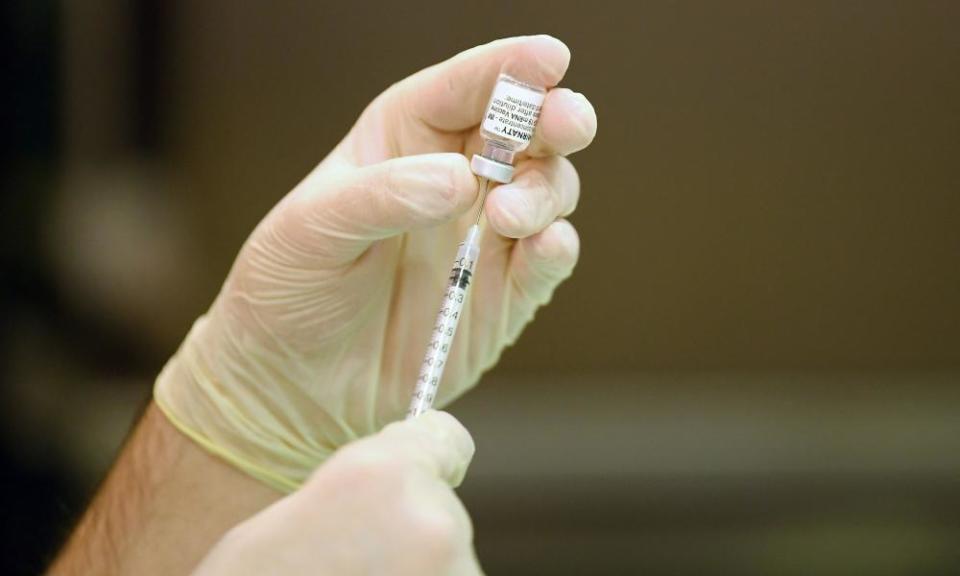Australian government considering helping local manufacture of mRNA Covid vaccines

The Morrison government is actively considering assisting Australian manufacturers to produce mRNA Covid-19 vaccines, such as Pfizer, at scale.
The federal health minister, Greg Hunt, said the government was developing a business case to help CSL, which is producing millions of doses of AstraZeneca vaccine, and other companies to switch focus to mRNA vaccines.
“[CSL] have said publicly that they are also considering moving to an mRNA capacity and others are considering mRNA capacity. So we are doing a business case now to look at that option,” he said.
default
“It won’t happen overnight, but already we have started that process of the business case and individual firms have expressed interest. So there is that capacity to do that.”
The Pfizer vaccine is recommended for people under 50 by Australia’s health authorities after the AstraZeneca treatment that is being produced domestically was linked to blood clotting, throwing the vaccination program into disarray.
The government has secured a further 20m Pfizer vaccines on top of the original 20m order, but they won’t arrive until late in the year, reigniting calls for Australia to develop its own mRNA production capabilities.
Earlier on Sunday, the home affairs minister, Karen Andrews, who was until recently the minister for science and technology, told Sky News it was “absolutely” possible Australia could manufacture a mRNA vaccine.
“We do have capability in Australia to manufacture mRNA vaccines. We don’t have the capacity to produce at scale at the moment,” Andrews said.
But Hunt clarified her comments, stating it was about having the capacity to adapt to produce an mRNA vaccine.
“The capacity that [Andrews] is talking about is that capacity to adapt … It’s very clear that that would mean that we would have a significant period of scaling up before we could do that,” he said.
Related: Family of three contract Covid from infected neighbours in hotel quarantine in Sydney
The Australian Academy of Science and mRNA experts have urged the Australian government for months to help develop a domestic mRNA manufacturing capability.
In February, the academy used a budget submission to warn that Australia and the region would be vulnerable to supply limitations without the ability to produce mRNA vaccines.
Dr Archa Fox, a leading mRNA expert with the University of Western Australia, told the Guardian that Australia could not currently produce mRNA.
“There are two researchers in Australia who have government funding to develop a mRNA vaccine against Sars-Cov2 and they have not been able to find a local supplier even for phase 1 clinical trials,” she said. “They can make mRNA vaccine in their labs, but that’s all.”
Related: Torres Strait faces significant Covid risk from nearby PNG as AstraZeneca vaccine rollout paused
One of those researchers, Prof Colin Pouton from Monash University told the ABC earlier this month that CSL was the only manufacturer that could make the Pfizer vaccine under licence and at scale in the near future.
CSL is making the AstraZeneca vaccine, and has previously expressed interest in producing mRNA vaccines, but indicated it would require significant financial investment to switch.
A contract published last week shows the industry department paid consultants McKinsey & Company $2m to prepare a business case for onshore mRNA vaccine manufacturing. The work began in December and was scheduled to be completed by the end of March.
Hunt declined to name any other companies expressing interest in developing mRNA manufacturing capability aside from CSL, saying it would take the better part of a year before manufacturing could begin in Australia.
The national cabinet was due to meet on Monday to discuss the vaccine rollout, as well as how to open up the economy in the future and perhaps moving to home quarantine.
“What we need to do is look sensibly at how we are going to bring people into Australia so that we can reopen our economy,” Andrews said.
“What we shouldn’t be doing is leaping into solutions now without having all the evidence in front of us.”
Authorities will continuously review all vaccines in use following the death of a 48-year-old woman that is considered to be linked to the AstraZeneca jab.
A safety group convened by the Therapeutic Goods Administration has concluded the NSW woman’s case of blood clots with low platelet count was likely to do with her vaccination on 8 April.
Government advice surrounding the use of the AstraZeneca jab was changed later on the day Genene Norris was inoculated, and Australians under 50 were urged not to take it any more.
She was admitted to hospital four days later and died last week.
TGA secretary John Skerritt said her case was “atypical” and further review of her underlying conditions and other blood tests and samples would be taken.
The case is likely to be the subject of an inquest.
It is the third in Australia involving blood clots with low platelet count post-vaccination, with the first two cases still in hospital.
About 885,000 AstraZeneca doses have been administered in Australia so far.
The chief medical officer, Paul Kelly, confirmed some Australians had been reluctant to receive a vaccine since the medical advice on the AstraZeneca version was updated.
However, he stressed the vaccines were safer than the alternative, quoting an Oxford University study which found the risk of blood clots in the brain was eight times more likely after a Covid-19 infection than an AstraZeneca vaccination.

 Yahoo Finance
Yahoo Finance 